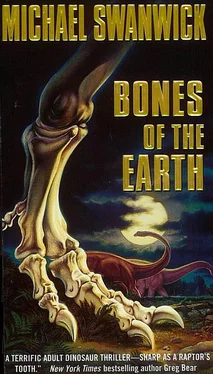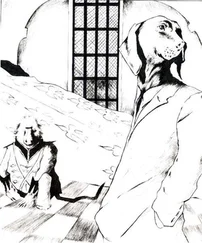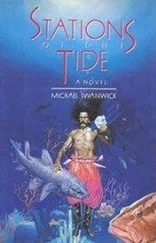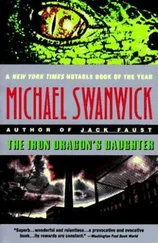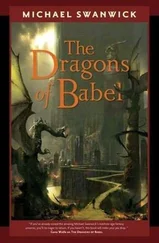Except, perhaps, the central mystery. All he had were facts, and none of his knowledge was necessary. The bones found their proper order with every triceratops born. The biochemical pathways policed themselves. The animals lived, mated, and died quite successfully without his intervention.
Chuck was here and he was gone.
It seemed impossible.
He didn’t understand it at all.
The forest was black upon black. It made his sight swim. It made him feel small, just one more transient mote of life moving inexorably toward death.
For all his knowledge, he knew nothing. For all he had learned, his understanding was nil. He stood at the lightless center of a universe totally devoid of meaning. There were no answers here, no answers within, no answers anywhere.
He stared off into the darkness. He wanted to walk straight into it and never come back.
So great was his unhappiness at that moment that it seemed to him that the night itself was sobbing. All the bleak forest and starless sky shook with a low, muffled noise that was the perfect embodiment of misery. Then, with a start, he realized that the sound was Tamara weeping softly in the tent.
She hadn’t gone to sleep after all.
Well, of course she hadn’t. After what had happened to Chuck, how could she? Even if she hadn’t seen it happen, even if they hadn’t been close, his loss reduced the human population of the world to ten. It was an unparalleled catastrophe. It was cause for terrible grief. Which made it his duty to go into the tent and comfort her.
His spirit quailed at the thought. I can’t, he thought angrily. I don’t have any comfort in me. There’s nothing here but misery and self-pity. He had no strength at all, no power to endure. He felt that if he took on a single grain more of the world’s pain, it would crush him flat.
Tamara went on crying.
Well, let her! Maybe it was selfish of him, but he wasn’t going to subject himself to anything more. He couldn’t! What did she expect of him? Tears were running down his cheeks, and he despised himself for them. What a fucking hypocrite he was! Of all the people there ever were, he was the last one that anybody would turn to for solace.
Still, Tamara did not stop crying.
You have to go in, he told himself. He couldn’t go in.
He went in.
Ultima Pangaea: Telezoic era. Mesognotic period. Chronic epoch. Epimethean age. 250 My C.E.
Jimmy was the first one out of the time funnel. He glanced around quickly, then moved aside so Griffin and Molly Gerhard could follow. They stepped out onto the sward after him.
It was night.
To one side was a copse of trees with low, tangled limbs—“climbing trees” Jimmy would have called them in his youth. Downslope was a lake. In the sky above its black waters hung a glory of stars. Colored lights rose and sank among them like lanterns.
The clearing was ringed with a dozen palely luminous gates. The funnel stood at its center.
A light breeze ruffled the waters of the lake. Molly Gerhard shivered, and finally spoke. “Which way now?”
Jimmy pointed toward one of the gates, where two dim figures, identical in size and height, waited. He said nothing. A touch of action always made him feel particularly calm and alert afterwards. He didn’t want to spoil that by talking.
The two figures resolved into women at their approach.
“Hello, Griffin,” Salley said.
“Hello, Griffin,” Gertrude said. The moon-shaped scar at the corner of her mouth sailed sardonically upward.
There was a quick exchange of glances in which Jimmy read anger, defiance, hauteur, hurt pride, and astonishment.
Molly Gerhard, who knew the history of that scar on the older woman’s face, gave voice to the last of these. “Tell me this is you from your own future…” (But Salley was already shaking her head dolefully.) “…and not the woman who got us into this mess.”
“She’s—” Salley began.
“I am the original me, and yes, I take full credit for all that’s happened.”
“That’s impossible.”
“Only to small minds,” Gertrude said.
“We can explain,” Salley said.
“I was told that divergent time lines could never meet,” Molly Gerhard said with an edge in her voice. “How can the two of you possibly exist in the same reality?”
Jimmy, watching, had to admire how efficiently she worked. Gerhard invited correction. She wasn’t afraid to sound foolish. And she directed her question at the older woman—Gertrude—while ignoring the younger—Salley. Thus driving the thinnest of wedges between the two and creating a division she might later wish to widen.
“Within your frame of reference, that was true,” Gertrude said. “Things are different on this side of Terminal City. You’ve been there. Surely you understand. Anyone with a modicum of perception would realize that its chief function is to reconcile the products of divergent time lines into a common reality.”
Salley’s eyes flicked toward her, then away.
“To what purpose?” Griffin asked.
“If nothing else, it enables us to meet.” Gertrude turned away. “Let’s go to my place. I’ll explain everything to you there.”
She stepped into the nearest gate and vanished. After the briefest of hesitations, Salley did likewise.
* * *
They had no choice but to follow.
Gertrude lived in a floating tower at the center of a ring forest in the Interior Sea. A soft, sultry breeze passed through the open windows, carrying with it the salt smell of the unseen sea. A sliver of new moon hung low in the sky. It had not been visible from the mouth of the time funnel. So Jimmy Boyle knew that the gate had transported them a goodly distance. Not so far, however, that it was not still night.
“Exactly where are we?” Molly Gerhard asked.
Gertrude snapped her fingers, and a map appeared in her hands. She opened it. “This is Ultima Pangaea. Continental drift has joined the scattered continents once more into a single landmass. It is surrounded by a world-spanning ocean and embraces at its heart a solitary inland sea.” She tapped a fingertip where the equator bisected the inland sea. “We’re right here. In a sense, I live at the exact center of the world.”
Of course, Jimmy thought. Where else?
The others were prowling about the room, examining things, opening drawers, displaying a curiosity that Gertrude ignored complacently, though Jimmy would never have allowed it in his digs. “You’ve got quite a few books here,” Griffin observed.
“All mine.”
“She means she wrote them,” Salley said.
“Yes, of course. What else would I mean?”
“What are these creatures?” Molly Gerhard asked.
One wall was nothing but windows. The wall opposite it was taken up by an earth-filled terrarium. A labyrinthine structure of tunnels and dens could be seen through the glass, with pale, hairless animals the size of mice within. “Naked mole birds,” Gertrude said. “They lost their feathers and their endothermy, and acquired a communal social structure. A fascinating case of convergent evolution. Behaviorally, they’re almost identical to naked mole rats. Yet their most recent common ancestor was a pre-Mesozoic creature that looked like a lizard.”
Molly Gerhard stared with undisguised loathing at the pallid creatures, climbing clumsily over one another, some few scrabbling at the dirt with needlelike talons and tiny beaks. “Why would you have such things?”
“For their inherent interest.”
“They have inherent interest?”
Gertrude snorted. “Bloodedness has always been the paleontologist’s Afghanistan,” she said. “Any number of scientists have marched off boldly to determine whether dinosaurs were warm-blooded or cold-blooded, and lost themselves in a wilderness of definitions. It turns out that bloodedness is not so simple as it looks from the outside. It’s not a single thing, but several families of strategies.
Читать дальше
